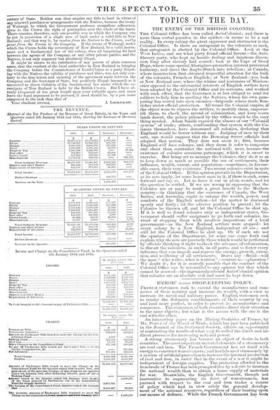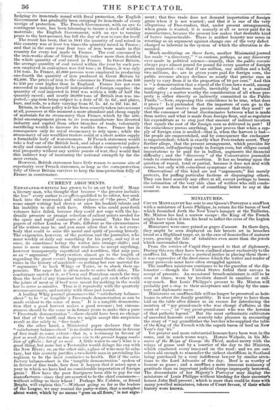HEROIC versus SHOP-KEEPING POLICY.
FRENCH statesmen seek to extend the manufactures and com- merce of their country and increase its wealth, with a view to
increase its naval and military power. English statesmen seek' to render the defensive establishments of their country by sea. and land more perfect, in order to protect its manufactures and. commerce. The statesmen of both countries direct their attention to the same objects ; but what is the means with the one is the end with the other.
An interesting paper on the Mining Statistics of France by Mr. Porter of the Board of Trfule, which has just been published in the Journal of the Statistical Society, affords an opportunity of contrasting the results of what may be called the direct and in- direct processes for increasing national power.
A strong steam-navy has become an object of desire in both countries. The most important material elements of a steam-navy • are coal and. iron. The French Government has set itself with energy to construct war-steamers; and has laboured strenuously by a system of artificial protection to increase the internal production
of coal and iron' in order that in the event of a war it might be in dependent of foreign supplies. The protection afforded to the
iron-trade of France has been prompted less by a desire to increase the national wealth than to obtain a home supply of materials for war. Meanwhile, the English Government, though not inattentive to augmenting its force of war-steamers, has pursued with respect to the coal and iron trades a course of policy which had in view solely the general develop- ment of the national resources, regardless of their bearing upon our means of defence. While the French Government has been
hedging its iron-trade round with fiscal protection, the English Government has gradually been stripping its iron-trade of every vestige of protection. The French Government, with an eye to contingent wars, has been labouring to insure a stock of warlike materials ; the English Government, with an eye to turning. peace to the best account, has left the day of war to care for itself. The result has been, that in 1841 the quantity of coal raised in this country was at least ten times the quantity raised in France ; and that in the same year four tons of iron were made in this country for every ton made in France. The coal consumed in the iron-works alone of Great Britain rather more than doubled the whole quantity of coal raised in France. In Great Britain, the average quantity of coal raised within the year by each per- son employed in coal-mines was 253 tons ; hi France, it was only 116 tons. In France, 47,800 persons were employed in producing "one-fourth the quantity of iron produced in Great Britain by 42,400. The prices of iron to the consumer in France are from 100 -to 250 per cent higher than in England. France has not even succeeded in making herself independent of foreign supplies: the quantity of coal imported in 1841 was within a trifle of half the quantity raised ; and nearly 50,000 tons of British iron was im- ported,—pig-iron being subject to a duty of 3/. 2s. 6d., and plates, bars, and rods, to a duty varying from 8/. 7s. 4d. to 16/. 14s. 9d.
Britain, in whose policy war has been scarcely taken into account at all, possesses at this moment a more abundant and cheap supply of materials for its steam-navy than France which by the artr- ficial encouragement given to its iron-manufacture has diverted industry and capital from other branches of trade, voluntarily sacrificing wealth to increase its warlike force. France has in . consequence only its royal steam-navy to rely upon ; while the
• steam-navy of our wealthier traders could at a short notice supply a formidable body of war-steamers. If French statesmen would take a leaf out of the British book, and adopt a commercial policy really and sincerely- intended to promote their country's commer- cial prosperity without any arriere pensee of war, they would find this indirect way of increasing the national strength by far the most certain.
However, British statesmen have little reason to assume airs of superiority over French statesmen, so long as the corn-protection folly of Great Britain survives to keep the iron-protection folly of Prance in countenance.



























 Previous page
Previous page